Mark Webber can't wait for 'incredible' F1 season as new owners Liberty Media make the changes the sport needs
Exclusive: Former F1 driver tells David Tremayne why he believes the years of 'horrible cars' are over and why the first grand prix of the season could see anyone on the top step of the podium

Your support helps us to tell the story
From reproductive rights to climate change to Big Tech, The Independent is on the ground when the story is developing. Whether it's investigating the financials of Elon Musk's pro-Trump PAC or producing our latest documentary, 'The A Word', which shines a light on the American women fighting for reproductive rights, we know how important it is to parse out the facts from the messaging.
At such a critical moment in US history, we need reporters on the ground. Your donation allows us to keep sending journalists to speak to both sides of the story.
The Independent is trusted by Americans across the entire political spectrum. And unlike many other quality news outlets, we choose not to lock Americans out of our reporting and analysis with paywalls. We believe quality journalism should be available to everyone, paid for by those who can afford it.
Your support makes all the difference.“What’s incredible here today,” Mark Webber says ahead of Sunday’s Rolex Australian Grand Prix, “is that nobody right now knows who’s going to win…”
The former Red Bull racer, winner of eight grands prix as Sebastian Vettel’s partner, the 2015 world sportscar champion, and now a television pundit and brand ambassador for the sponsoring watch company Rolex, bubbles with enthusiasm for the new breed of F1 cars.
“They are what we need,” he avers. “They’re long overdue. When we had those horrible cars between 2011 and 2013, they were not stimulating for the drivers. The entertainment factor was clearly in play, with lots of overtakes and sometimes four-stop strategies, but maybe it went too far. It was very artificial for the drivers.
“With these cars, there are consequences. They are fast, harder to put on the limit, the guys are a little bit apprehensive. It’s great to see them exposed. I don’t want to see people look silly, but I want the best to be tested. That’s good.”
Few are better qualified to identify the weaknesses of the top dogs, having raced them wheel-to-wheel.
“Lewis [Hamilton] is probably the trickiest nut to crack,” he chuckles. “He has a lot of strings in his bow, he is very good in all conditions, he’s not track-sensitive, and in wheel-to-wheel combat, no worries. I can’t find any weaknesses in him! Maybe he can be fragile if a weekend doesn’t get off to a good start with the set-up, but I’m talking granules, absolute granules here.
“Daniel [Ricciardo] still loves to fight, but is the honey badger still able to bite? I think he is. That’s what we want to see from him.
There was that wonderful radio call when I won the grand prix in Hungary in 2010: ‘How is that possible? How is Mark in front?'
“When Sebastian [Vettel] is not winning, he can get flustered. When he’s winning, he’s devastating. When he’s not, he has outbursts and it’s everybody’s problem. He can lack composure. He has that streak of German mentality. There was that wonderful radio call when I won the grand prix in Hungary in 2010: ‘How is that possible? How is Mark in front?’
“With Fernando [Alonso], his qualifying pace is the only thing; there’s a tenth and a half maybe missing against Lewis. But how many front wings has Fernando damaged in his career? Fewer than any of these guys. That’s where he’s so phenomenal. He is always teeing up his moves for the soft kills, executions. Not for him any dive-bombing into corners like Lewis, Daniel or Seb might get away with; he likes to get the other guy off line and pass him with a big exit.
“And Max [Verstappen]? Experience. Look at Monaco last year. In Barcelona I couldn’t believe my eyes, to close that race out like he did was just exceptional, to keep Kimi [Raikkonen], with 250 races’ experience, behind him. Then we go to Monaco… Those barriers there, they don’t care who you are, they aren’t going to move. They’re going to win. And he destroyed all his cars against them…”

He laughs as he draws breath after the characteristically candid, and rapid-fire delivery of his racer’s snap verdicts. “That’s a tough list you gave me! And all these guys are better than me, so I’m just answering your question…”
It was his friend Alonso who said the new cars don’t have to be nursed, as if driven by children.
“That was a very powerful statement, but it’s correct,” he agrees, eyes lighting up. “That’s fantastic for the sport. The new rules are the first step; the next is deciding what levers we are trying to pull in terms of entertainment. Is the race distance correct? I believe it is. Others may disagree. How many overtaking moves do we want to see? Can we help the smaller teams compete with the big teams? Forget success ballast or reverse grids, we want hardcore racing.”
He believes there is tremendous scope for huge expansion under the new ownership of Liberty Media.
“I see this as a great opportunity for the sport, but we have to keep the human component in there, that’s crucial. People are always attracted to the gladiatorial aspect. That’s what they love to watch. Like they used to love watching Jackie Stewart, who will have been with Rolex for half a century next year. Or like today they watch Roger Federer. Are you gonna watch him play tennis for four and a half hours? Absolutely!
“I want to see passion. I flew down here with [FIA president] Jean Todt from Hong Kong this morning; I told him that when I see a driver win a grand prix, I want to see him waving a national flag.

“I’ve been there, in that cockpit, and even 10 minutes is a long time to get yourself squared away emotionally, so maybe there’s a way we can tap into that emotion straight away, see the guy with tears and the veins standing out in his neck…
“The first time I won, I was nearly crying. The world wants to see that human response to emotion and passion, people react to that. And to an element of excellence and an element of technicity. F1 is very aspirational.
“I’m a country boy and it’s an honour to be associated with such great people and distinguished brands. And with Liberty Media I see a future for F1 to grow even more.
“We sit here and say that their proposals are unusual. But they are totally not new, except by F1 standards. So I see that as white canvas, a tremendous opportunity for greater expansion. Bernie was so brilliant in the early years, working out how to pull the juggernaut together in such a great way for decades and decades. But now? Getting Ross Brawn to handle the sporting side was a great signing. They have three years to work out the next rule changes.
“So far they haven’t made any missteps or kneejerk reactions. They’ve got the restaurant and the menu there already. They haven’t come in and started to turn it upside down. Say it’s Italian now, they’re not going to turn it into Chinese overnight. They have the time to attract more major-league companies such as Rolex to see the value of the sport as a dynamic marketing tool, more fans to enjoy it.
“Will they score a home run first timeout? Maybe not, but a crucial new era is beginning.”
Join our commenting forum
Join thought-provoking conversations, follow other Independent readers and see their replies
Comments